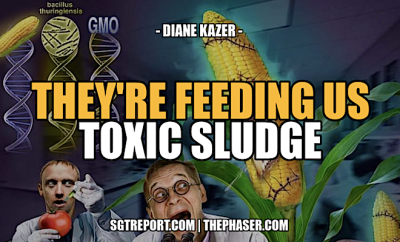 African Centre For Biodiversity
African Centre For Biodiversity
GMO
PR: SA Food Sovereignty Campaign: Laws regulating seeds in South Africa to entrench hunger and inequality
from African Centre For BioDiversity.com:
.On 15 May South Africa’s Portfolio Committee on Agriculture held
public hearings on two Bills that protect and regulate the commercial
seed industry; the Plant Breeders Rights (PBR) Bill and the Plant
Improvement Bill. The PBR Bill aims to stimulate innovation in plant
breeding by awarding extremely strong intellectual property rights to
breeders and the Plant Improvement Bill allows only certified seed to
be sold on the commercial market. Several NGOs and smallholder farmers
made submissions to the committee, saying that the laws will entrench
inequality and deepen the hunger crisis in the country because the
Bills are oblivious to seed systems that support smallholder farmers
and ecological forms of farming. These laws do not recognise or
protect farmer-managed seed systems or agricultural biodiversity but
undermine the rights of farmers, including their right to re-use,
exchange and sell farm-saved seeds.
South Africa is one of the few African countries that is Party to the
1978 International Union for Protection of Plant Varieties (UPOV) – an
intergovernmental organization that was established to reward breeders
for their new plant varieties by granting intellectual property rights
(IPRs) on the basis of a set of clearly defined principles. This has
resulted in highly industrialised seed sectors where commercial
breeders have strong protection, while farmers are restricted from
sharing or selling seed that is protected under this regime. The South
African PBR Bill (like its current Act), is based on UPOV 1991 and not
UPOV 1978. UPOV 1991 has been slammed world-wide for giving private
breeders excessive protection; criticisms include that UPOV 1991
protects private breeders IPRs but does not protect farmers’
varieties from misappropriation; that it promotes genetically uniform
seed suited to industrial chemical-dependent agricultural systems that
are environmentally harmful, that it does not exempt crops that are
important for food security from exclusive property rights and
critically, that it outlaws the age-old practice of exchanging seed
which has resulted in the agricultural diversity that we know today.
Seed exchange also provides safety nets amongst communities for food
sovereignty. The second Bill, the Plant Improvement Bill, could also
outlaw the sale or exchange of seed that does not meet stringent and
higly industralised certification standards set out in the Bill, and
these standards apply to commercial seed, not farmers’ varieties or
seed appropriate for ecological agriculture. This creates a deeply
troubling and inequitable situation where only certified corporate
seed is allowed on the market.
While South Africa is considered a food secure country, statistics
released by the Human Sciences Research Council (HSRC) show that 1 in
four children are stunted due to malnutrition and 26% of the
population (amounting to 14 million people) are hungry today. Another
28.6% are categorised as at risk of hunger. These figures show that
despite the fact that South Africa is completely dominated by large
scale industrial agriculture, there is still so much hunger. It would
clearly make a difference if more food production was in the hands of
smallholder farmers, who can put diverse quality food on tables, but
their way of farming and in particular, their seed systems, are being
ignored and undermined. Statistics on the numbers of smallholder
farmers in South Africa remain vague as does the official definition
of a smallholder; during the hearing Agriculture Portfolio Committee
Chair, Ms Rosina Semenya, stated that the government recognises 64 000
small-scale farmers in South Africa, while the South African
Agricultural Production Strategy 2011– 2025 reports that there are
1.3 million smallholder farming households, primarily concentrated in
former homelands. Regardless of which definition is applied, this
represents a significant number of farmers that have been left out of
the two Bills and who are in need government support.
Haidee Swanby of the African Centre for Biodiversity (ACB), which
presented on both Bills, told MPs that “South Africa’s food system
is controlled by just a handful of powerful corporations which decide
what we eat and what we will pay. For example, our maize seed sector
is dominated by two foreign multinationals – Monsanto and Du Pont.
Their expensive seed and technology maintains the status quo in South
Africa where only the elite may produce maize and compete in the maize
value chain. Our laws cannot only cater for the interests of one
sector, but must also stimulate plant breeding that is appropriate for
small-scale resource poor farmers to produce nutritious food for
household food security and local markets”.
Smallholder farmers from Zimele Rural Women’s Empowerment
Organisation and Msebe Project, hailing from rural KwaZulu Natal also
presented and displayed their seeds. Richard Mthembu of Msebe Project
told MPs that, “we farm without harmful chemicals or fertilizers and
use traditional seeds. We are proud of our agricultural heritage”.
However, the laws proposed by government do not stimulate innovation
in plant breeding that is appropriate to small-scale ecological
agriculture and in some instances criminalises the age old practice of
recycling and exchange of seed. These same farmers will participate in
the international “March against Monsanto” taking place on 23 May
to protest against the corporate control of seed and the erosion of
farmers’ rights.
Elfrieda Pschorn-Strauss of Biowatch, which works closely with Zimele
and Msebe, noted in her submission that, “we have lost an estimated
90% of our agro-biodiversity over the past 100 years largely due to
industrial agriculture, which promotes uniformity rather than
diversity as well as polluting the environment with harmful
chemicals”. Pschorn-Strauss also highlighted that commercial seeds
have been made possible due to the intellectual efforts of farmers
over the ages, but this effort is not recognised and is open for
exploitation by private interests.
A number of organisations that attended the hearings are members of a
newly formed campaign called the South African Food Sovereignty
Campaign (SAFSC), which recently held a 3-day Tribunal on Hunger, High
Food Prices and Landlessness. SAFSC committee member, Karen Read,
echoed one of the outcomes of Tribunal, saying that, “The support
for small scale farmers is inadequate while support programmes impose
GMO seeds and chemical fertilisers. The state is ignorant about the
value and importance of agro-ecology for small scale farmers and it
does not give farmers a choice to advance agro-ecology or to make
decent livelihoods and stimulate local economies around food”.
The Plant Improvement Bill and Plant Breeders Rights Bill will be
presented in the National Council of Provinces (NCOP) once it has gone
through Parliament. Members of the SAFSC will demand further
consultation at provincial level, where they will once again insist
that the plight of smallholders and the contribution they make to food
security be recognised in any new agriculture-related legislation.
ENDS//
Contact:
African Centre for Biodiversity: Haidee Swanby: haidee@acbio.org.za
082 459 8548
Biowatch: Elfrieda Pschorn-Strauss: elfrieda.strauss47@gmail.com 082
413 0502
SAFSC: Karen Read: karen@biowatch.org.za 083 783 1515
Msebe Project: Richard Mthembu 076 158 1341 (preferably Zulu
interview)
NOTES TO EDITORS
Most African governments have not joined UPOV to date, because the
seed industry has a scant footprint on the continent and it is they
who require such protection. South Africa and Kenya are members of
UPOV 1978, while Morocco and Tunisia are members of UPOV 1991.
However, African governments are being encouraged to sign regional
frameworks governing plant variety protection, based on UPOV 1991.
Regional Economic Communities (RECs), such as SADC and COMESA are in
the final stages of completion of these laws. Other bodies, such as
the African Regional Intellectual Property Organisation (ARIPO) and
its West African counterpart OAPI have also developed regional
frameworks.
To gain protection, a variety must (i) distinct from existing,
commonly known varieties, (ii) sufficiently uniform, (iii) stable and
(iv) new in the sense that they must not have been commercialized
prior to certain dates established by reference to the date of the
application for protection. These criteria effectively rule out
farmers varieties which are valued for their genetic diversity and
adaptability.
The HSRC published the South African Nutrition and Health Examination
Survey (SANHANES_1) in August 2013.
<http://www.hsrc.ac.za/
The South African Food Sovereignty Campaign (SAFSC) was launched in March 2015 after a meeting of over 50 organisations representing the hungry, the landless and the exploited people of South Africa involved in agrarian, water and land transformation, environmental justice, small scale farming, cooperatives, the solidarity economy movement, waste pickers, the unemployed and activists campaigning against increasing food prices. Declaration available at
http://www.copac.org.za/
<http://www.copac.org.za/news/
March against Monsanto events South Africa
<https://www.facebook.com/
Read More @ African Centre for Biodiversity.com












